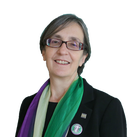The problem with Wikipedia? There aren’t enough women on it
England’s success at the Women’s Euros is a bit undermined by the fact only 6.5 per cent of biographies of football players on Wikipedia are of women

Your support helps us to tell the story
From reproductive rights to climate change to Big Tech, The Independent is on the ground when the story is developing. Whether it's investigating the financials of Elon Musk's pro-Trump PAC or producing our latest documentary, 'The A Word', which shines a light on the American women fighting for reproductive rights, we know how important it is to parse out the facts from the messaging.
At such a critical moment in US history, we need reporters on the ground. Your donation allows us to keep sending journalists to speak to both sides of the story.
The Independent is trusted by Americans across the entire political spectrum. And unlike many other quality news outlets, we choose not to lock Americans out of our reporting and analysis with paywalls. We believe quality journalism should be available to everyone, paid for by those who can afford it.
Your support makes all the difference.Wikipedia has become an intrinsic part of everyday life. It is more than just a repository of human knowledge; its ubiquity means it plays a real part in shaping our society.
English-language Wikipedia gets more than 250 million page views a day. Sometimes we are looking for a source of credible information in a targeted search, at other times we end up exploring the infinity of hyperlinks as one random question leads to another in a solo or group quest for answers.
Yet if we stand back to think about what is recorded and what is not, whose lives and achievements are documented on Wikipedia and whose are not, and who puts in the entries and what perspectives they hold, it becomes clear that the online encyclopedia mirrors society. It reflects existing inequalities and crucially even magnifies them. Wikipedia’s unique democratisation of editorial rights, where any individual can theoretically tinker with or remove information, can intensify this magnification.
Of the nearly 1.9 million biographies of notable individuals on English-language Wikipedia – from authors to scientists, celebrities and academics, politicians and sportspeople – a mere 19 per cent are women. This mirrors unequal representation more generally.
For example, in news coverage, 70 per cent of people seen, quoted and heard are men, and about 80 per cent of expert sources are men. Within political news coverage, women are only the subject of political and governmental coverage 16 per cent of the time. When male experts form the majority of opinions heard, women’s accomplishments not only lack public recognition but their hard work is devalued.
And then there is the issue of where women are represented in the media and on Wikipedia. When we group the biographical articles by profession, there is indeed a selection that contains more about women than men, but the list is telling. The top 25 categories where this is the case include nun, women’s rights activist, sex worker, erotic model, royal consort and homemaker.
This month, England is hosting the Women’s Euros and many will be supporting our Lionesses as they progress towards the finals. Yet only 6.5 per cent of biographies of football players on Wikipedia are women. The Women in Red project has identified thousands of notable female footballers that are “in red”, meaning they do not have a Wikipedia profile despite their achievements. Even more shamefully, there are currently more entries on Wikipedia about male football and footballers than there are about women in their entirety!
Within politics, women have fared no better. Women serve as heads of state or government in only 22 countries, while there are 119 countries that still have never had a woman as leader. Although the proportion of female MPs in the UK is at an all-time high, they still – again shamefully – only account for 34 per cent of MPs in total and only 28 per cent of peers are female. Wikipedia reflects and exacerbates this inequality: only 13.3 per cent of profiles on politicians are about women.
To keep up to speed with all the latest opinions and comment, sign up to our free weekly Voices Dispatches newsletter by clicking here
The new #ChangeTheStory campaign by CARE International, Wikimedia UK and Women in Red seeks to draw attention to the importance of increasing the number of Wikipedia profiles of women. Recognition and greater representation mean greater support and opportunities for women around the world. There is no shortage of great women – far from it; just not enough representation and telling of their stories.
The world of Wikipedia and the online world more generally reflects and informs our society. It is both a symptom of inequality in society but it is also becoming a cause, exacerbating existing biases. This needn’t be. People can become editors and help fill the gaps, they can join the #ChangeTheStory campaign and help Wiki be part of the change rather than part of the problem.
Redressing the balance on Wikipedia is one step towards equality, social justice and acknowledgement of women’s power. We can help Wiki become one place, one global arena, in which women – in all their diversity – gain the legitimacy, authority and status they deserve.
Helen Pankhurst CBE is an activist, scholar and writer
Learn more about the Women in Red project and sign up as a Wikipedia editor to help ‘write the wrongs’ regarding gender representation on Wikipedia

Join our commenting forum
Join thought-provoking conversations, follow other Independent readers and see their replies
Comments